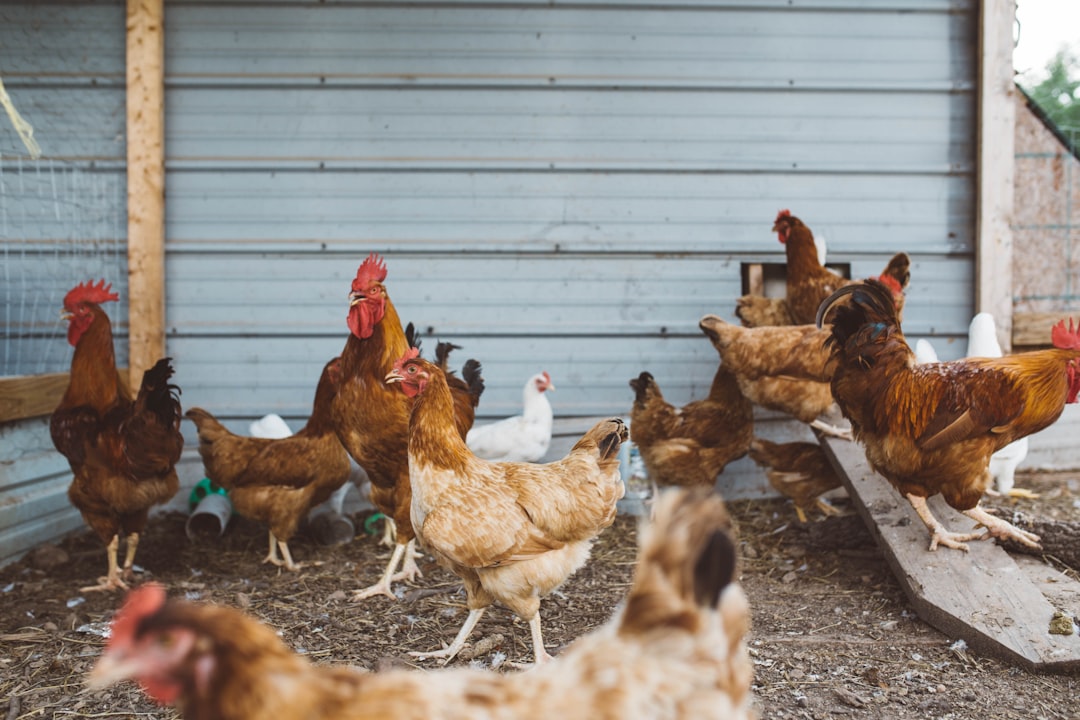Composting Chicken Manure: A Guide to Using a Bin

Composting chicken manure is the process of breaking down and decomposing chicken waste into a nutrient-rich fertilizer that can be used in gardens and farms. Chicken manure is an excellent source of organic matter and nutrients such as nitrogen, phosphorus, and potassium, making it a valuable resource for improving soil health and promoting plant growth. Composting chicken manure not only helps to reduce waste and odor but also reduces the risk of pathogens and parasites that can be harmful to both humans and animals.
Key Takeaways
- Composting chicken manure is an effective way to turn waste into a valuable resource.
- Benefits of composting chicken manure include reducing waste, improving soil health, and reducing the risk of disease.
- Choosing the right bin for composting chicken manure depends on the amount of waste and available space.
- Preparing the bin for composting chicken manure involves adding a layer of carbon-rich materials and ensuring proper drainage.
- Collecting and storing chicken manure for composting requires a covered container and regular cleaning to prevent odors and pests.
Benefits of Composting Chicken Manure
One of the main benefits of composting chicken manure is that it provides a nutrient-rich fertilizer for plants. The high levels of nitrogen, phosphorus, and potassium in chicken manure make it an excellent source of nutrients for plants. When composted, these nutrients are released slowly over time, providing a steady supply of food for plants. This can result in healthier plants with increased yields.
Composting chicken manure also helps to reduce waste and odor. By composting chicken manure, you are effectively recycling and reusing a valuable resource instead of allowing it to go to waste. Additionally, the composting process helps to break down organic matter and eliminate odors, making it more pleasant to work with.
Another benefit of composting chicken manure is that it improves soil structure and water retention. The organic matter in the compost helps to improve soil structure by increasing its ability to hold water and nutrients. This can result in better drainage and reduced erosion. Compost also acts as a natural mulch, helping to regulate soil temperature and prevent weed growth.
Furthermore, composting chicken manure reduces the risk of pathogens and parasites. The high temperatures reached during the composting process help to kill off harmful bacteria, viruses, and parasites that may be present in the manure. This makes the compost safer to handle and use in gardens and farms.
Choosing the Right Bin for Composting Chicken Manure
When it comes to composting chicken manure, choosing the right bin is essential. There are several types of bins available, including compost tumblers, compost bins, and open piles. The type of bin you choose will depend on your specific needs and preferences.
Factors to consider when choosing a bin include the amount of chicken manure you have, the space available, and the desired composting method. Compost tumblers are ideal for small-scale composting and are easy to turn and maintain. Compost bins are larger and can accommodate larger amounts of chicken manure. Open piles are the simplest and most cost-effective option but require more space and maintenance.
Preparing the Bin for Composting Chicken Manure
| Step | Description | Metric |
|---|---|---|
| 1 | Choose a bin | Size (in cubic feet) |
| 2 | Add bedding | Amount (in pounds) |
| 3 | Add chicken manure | Amount (in pounds) |
| 4 | Add water | Amount (in gallons) |
| 5 | Mix ingredients | Time (in minutes) |
| 6 | Monitor temperature | Temperature (in degrees Fahrenheit) |
| 7 | Turn compost | Frequency (in days) |
| 8 | Harvest compost | Amount (in pounds) |
Before you start composting chicken manure, it’s important to prepare the bin properly. The location and placement of the bin are crucial factors to consider. Choose a location that is well-drained and receives adequate sunlight. Avoid placing the bin near water sources or areas where runoff can contaminate nearby water bodies.
Once you have chosen a location, prepare the bin by adding a base layer of materials. This can include straw, leaves, or wood chips. The base layer helps to improve airflow and drainage in the compost pile.
Additionally, it’s important to add drainage holes to the bin to prevent water from pooling at the bottom. This helps to maintain proper moisture levels in the compost pile and prevents it from becoming too wet.
Collecting and Storing Chicken Manure for Composting
When collecting chicken manure for composting, it’s important to follow best practices to ensure safety and effectiveness. Start by regularly cleaning out your chicken coop or run to remove any accumulated manure. Use a shovel or rake to collect the manure and transfer it to a designated storage area.
It’s important to store chicken manure properly before composting. Store the manure in a covered container or bin to prevent it from getting wet and attracting flies. Avoid storing the manure for extended periods, as this can lead to the loss of valuable nutrients.
Adding Carbon-Rich Materials to the Bin

To ensure successful composting, it’s important to balance carbon and nitrogen in the compost pile. Chicken manure is high in nitrogen, so it’s important to add carbon-rich materials to balance it out. Carbon-rich materials include dry leaves, straw, wood chips, and shredded paper.
Add a layer of carbon-rich materials on top of the base layer in the bin. This helps to create airflow and prevent the pile from becoming too compacted. Alternate layers of chicken manure with layers of carbon-rich materials to maintain a balanced compost pile.
Maintaining the Right Moisture Level in the Bin
Moisture is an important factor in the composting process. The compost pile should be moist but not overly wet. Too much moisture can lead to anaerobic conditions and unpleasant odors, while too little moisture can slow down the decomposition process.
To maintain the right moisture level, monitor the compost pile regularly. If the pile feels dry, add water using a hose or watering can. If the pile feels too wet, add more carbon-rich materials to absorb excess moisture.
Turning and Aerating the Compost Pile
Turning and aerating the compost pile is essential for proper decomposition and to prevent odors. Turning the pile helps to mix the materials and expose them to oxygen, which speeds up the decomposition process. It also helps to distribute moisture evenly throughout the pile.
How often you should turn the compost pile depends on several factors, including the size of the pile and the temperature outside. As a general rule, aim to turn the pile every 1-2 weeks. Use a pitchfork or shovel to turn the pile, mixing the materials thoroughly.
Harvesting and Using Composted Chicken Manure
Signs that the compost is ready to use include a dark, crumbly texture and an earthy smell. The compost should no longer resemble the original materials and should be fully decomposed. This process can take anywhere from a few months to a year, depending on various factors such as temperature and moisture levels.
To use composted chicken manure in the garden, spread a layer of compost over the soil surface and gently work it into the top few inches of soil. This helps to improve soil structure, fertility, and water retention. Composted chicken manure can also be used as a mulch around plants to help retain moisture and suppress weed growth.
Troubleshooting Common Issues with Composting Chicken Manure
Common problems with composting chicken manure include odors, pests, and slow decomposition. To avoid odors, make sure the compost pile is properly balanced with carbon-rich materials and turned regularly. To prevent pests, avoid adding meat scraps or oily foods to the compost pile.
If the compost pile is decomposing slowly, check the moisture levels and adjust as necessary. Also, make sure the pile is properly aerated by turning it regularly.
Composting chicken manure is a beneficial practice that not only helps to reduce waste but also provides a nutrient-rich fertilizer for plants. By composting chicken manure, you can improve soil structure, water retention, and plant growth while reducing the risk of pathogens and parasites. Choosing the right bin, preparing it properly, collecting and storing chicken manure correctly, adding carbon-rich materials, maintaining the right moisture level, turning and aerating the compost pile, and harvesting and using composted chicken manure are all important steps in the composting process. By following these steps and troubleshooting common issues, you can successfully compost chicken manure at home and reap the many benefits it provides. So why not give it a try and start composting chicken manure today?
If you’re looking for a comprehensive guide on composting chicken manure, look no further than Lawn World’s informative article on the topic. This article provides step-by-step instructions on how to create a compost bin specifically designed for chicken manure. From choosing the right materials to maintaining the ideal moisture levels, this guide covers it all. To learn more about composting chicken manure, check out Lawn World’s article here.
FAQs
What is a compost bin for chicken manure?
A compost bin for chicken manure is a container used to collect and decompose chicken manure and other organic materials to create nutrient-rich compost for gardening and farming.
Why is composting chicken manure important?
Composting chicken manure is important because it helps to reduce waste, prevent pollution, and create a valuable resource for gardening and farming. Chicken manure is high in nitrogen and other nutrients that are beneficial for plants, but it can also be harmful if not properly composted.
How does a compost bin for chicken manure work?
A compost bin for chicken manure works by providing a controlled environment for the decomposition of organic materials. The bin is filled with a mixture of chicken manure, straw, leaves, and other organic materials, and then turned regularly to promote decomposition. Over time, the materials break down into nutrient-rich compost that can be used to fertilize plants.
What are the benefits of using compost from a chicken manure compost bin?
The benefits of using compost from a chicken manure compost bin include improved soil health, increased plant growth and yield, reduced need for chemical fertilizers, and reduced waste and pollution.
What should be put in a compost bin for chicken manure?
In addition to chicken manure, a compost bin for chicken manure should be filled with a mixture of straw, leaves, grass clippings, and other organic materials. It is important to avoid adding meat, dairy, or oily foods, as these can attract pests and slow down the composting process.
How long does it take for chicken manure to compost?
The time it takes for chicken manure to compost depends on a variety of factors, including the size of the compost bin, the temperature and moisture levels, and the frequency of turning. In general, it can take anywhere from a few weeks to several months for chicken manure to fully decompose into compost.



